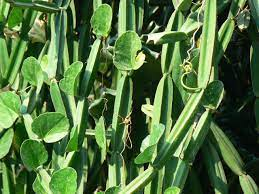SIRUKURINJAN (Gymnema sylvestre)
Sirukurinjan,
scientifically known as Gymnema sylvestre, is a remarkable medicinal herb that
has been treasured in traditional Indian medicine systems for centuries. This
plant, native to the tropical forests of India, particularly in the southern
region, has gained significant attention for its therapeutic properties and its
role in managing diabetes. Let us delve into the depths of Sirukurinjan and
explore its fascinating medicinal uses.
Description
and Habitat: Sirukurinjan is a perennial woody climber that belongs to the
Apocynaceae family. It is a vine-like plant that can reach a height of 4 to 5
meters, with elongated leaves and small yellow flowers. The plant thrives in
tropical and subtropical regions, including the forests of Tamil Nadu, Kerala,
and other parts of South India. It prefers well-drained soil and grows
abundantly in the wild.
Medicinal
Properties and Active Compounds: The therapeutic potential of Sirukurinjan lies
in its diverse array of bioactive compounds. The leaves and roots of the plant
contain valuable phytoconstituents such as gymnemic acids, saponins, flavones,
anthraquinones, and alkaloids. Among these, gymnemic acids are the primary
constituents responsible for the herb's medicinal effects.
Medicinal
Uses:
- Diabetes
Management: One of the most well-known and researched uses of Sirukurinjan
is in the management of diabetes. Gymnemic acids in the plant have been
found to exhibit anti-diabetic properties by acting in multiple ways. They
help reduce blood sugar levels by stimulating insulin secretion, enhancing
glucose uptake, and regenerating pancreatic beta cells. The herb also
curbs sugar cravings by suppressing the taste of sweetness, making it a
valuable aid for individuals with diabetes or those seeking to control
their sugar intake.
- Blood Sugar
Regulation: Beyond diabetes management, Sirukurinjan is also used to
regulate blood sugar levels in individuals with prediabetes and metabolic
syndrome. It helps maintain healthy glucose metabolism, preventing spikes
and crashes in blood sugar levels. Regular consumption of Sirukurinjan
extract or tea has shown promising results in improving insulin
sensitivity and overall glycemic control.
- Weight Management:
Obesity and excessive weight gain are often contributing factors to
diabetes and related complications. Sirukurinjan can be a useful adjunct
in weight management programs due to its potential to reduce food cravings
and support healthy metabolism. By inhibiting the absorption of sugar and
fats, it aids in weight loss and prevents further weight gain.
- Anti-Inflammatory
and Antioxidant Effects: Sirukurinjan possesses potent anti-inflammatory
and antioxidant properties. It helps reduce inflammation within the body,
which is associated with various chronic diseases, including diabetes. The
herb's antioxidant activity helps combat oxidative stress and protects the
body's cells from damage caused by free radicals.
- Cholesterol
Regulation: Studies have indicated that Sirukurinjan may help regulate
cholesterol levels by reducing LDL (low-density lipoprotein) cholesterol,
commonly known as "bad" cholesterol, and increasing HDL
(high-density lipoprotein) cholesterol, known as "good"
cholesterol. By maintaining healthy lipid profiles, it contributes to
cardiovascular health and reduces the risk of heart disease.
- Digestive Health:
In traditional medicine, Sirukurinjan has been used to support digestive
health. It aids in digestion, relieves constipation, and helps in the
treatment of gastric ulcers. The herb's anti-inflammatory and
antimicrobial properties may also help alleviate gastrointestinal
disorders and promote overall gut health.
- Oral Health: The
leaves of Sirukurinjan possess anti-cariogenic properties, making it
beneficial for oral health. Chewing the leaves or using its extract as a
mouthwash helps prevent dental caries and reduces plaque formation. It
also aids in the treatment of mouth ulcers and promotes oral hygiene.
- Wound Healing:
Sirukurinjan exhibits wound healing properties, making it valuable in
traditional medicine practices. The application of Sirukurinjan leaf paste
or its powder helps in the healing of cuts, burns, and other minor wounds.
- Other Uses: In
addition to its role in diabetes management, Sirukurinjan has been used in
traditional medicine for various conditions such as asthma, cough,
snakebite, urinary tract disorders, and as a general tonic to improve
overall well-being.
Precautions
and Considerations: While Sirukurinjan offers numerous potential health
benefits, it is essential to exercise caution and consider the following
points:
- Consultation: It is
advisable to consult a qualified healthcare professional before using
Sirukurinjan or its extracts, especially if you have an existing medical
condition or are on medication.
- Dosage: The
appropriate dosage of Sirukurinjan may vary based on individual needs and
health conditions. It is crucial to follow recommended guidelines and seek
professional guidance for optimal usage.
- Hypoglycemia:
Sirukurinjan may cause a significant reduction in blood sugar levels,
leading to hypoglycemia. Individuals with diabetes who are already on
medication to lower blood sugar should monitor their levels closely to
prevent complications.
- Allergies: Some
individuals may be allergic to Sirukurinjan or its components. If you
experience any adverse reactions such as rashes, itching, or breathing
difficulties, discontinue use and seek medical attention.
- Pregnancy and
Lactation: Pregnant and breastfeeding women should exercise caution and
consult a healthcare professional before using Sirukurinjan, as there is
limited scientific evidence regarding its safety in these situations.
In
conclusion, Sirukurinjan (Gymnema sylvestre) is a remarkable medicinal
herb with a long history of traditional use in India. Its potent anti-diabetic
properties, blood sugar regulation effects, and other therapeutic benefits make
it a valuable natural remedy. However, it is important to remember that
individual responses and requirements may vary, and professional guidance is crucial
for safe and effective use. As with any herbal medicine, it is advisable to
consult with a qualified healthcare provider before incorporating Sirukurinjan
into your healthcare routine.
HAPPY
BLOGGING!!!
DEEPIKA
KRISHNAMOORTHY
A
RESEARCH SCHOLAR



Comments
Post a Comment